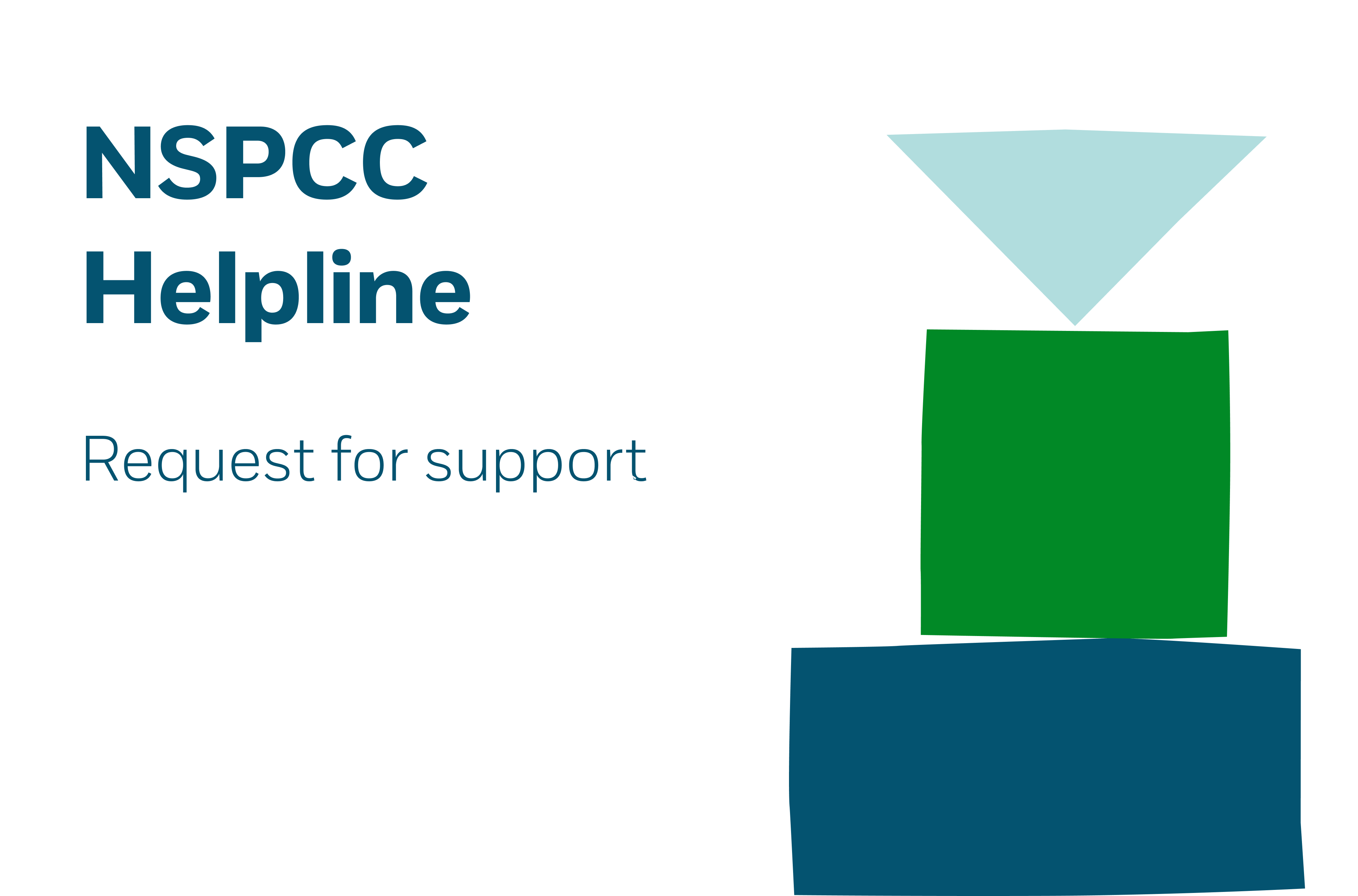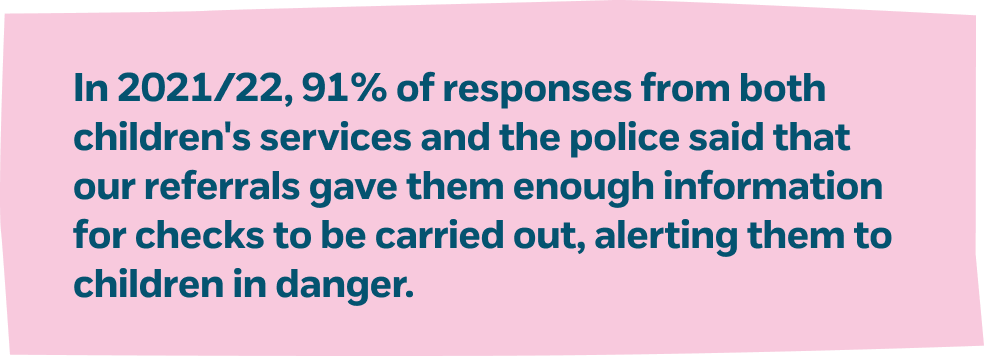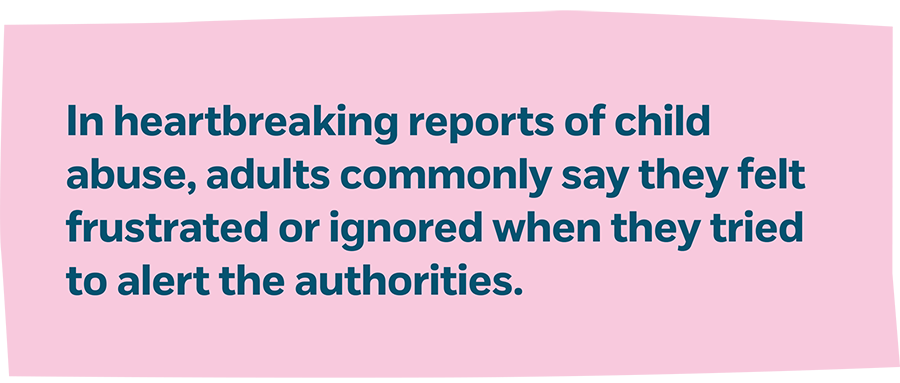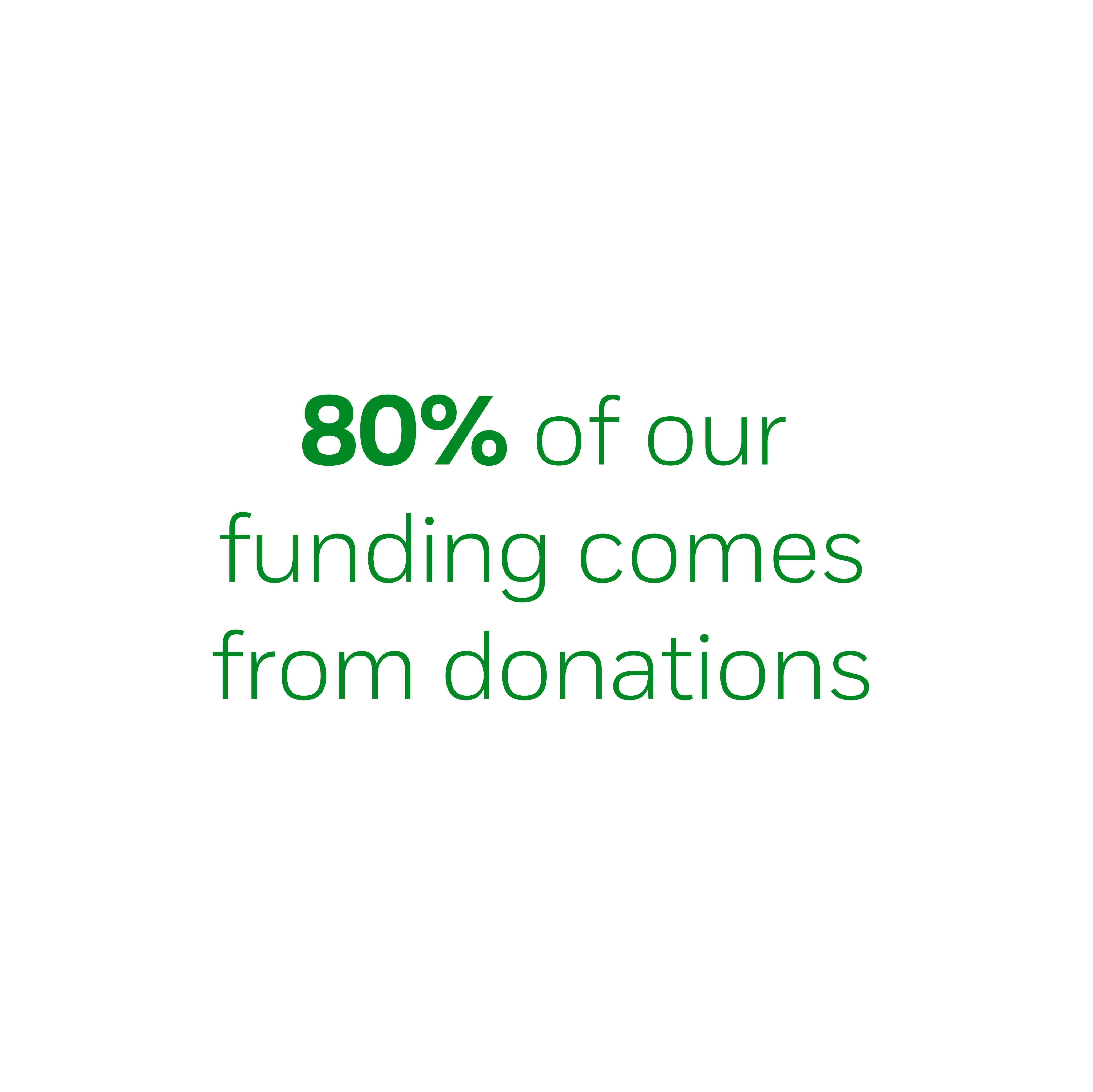
NSPCC frontline services
The NSPCC Helpline is our frontline support service for any adult concerned about the welfare of a child.
Staffed by expert child safety specialists, the Helpline gives parents and carers, professionals such as teachers or GPs, and the wider public a safe and supportive way to discuss a child's safety.
The calls and messages we receive range from stories about children experiencing neglect to concerns a child may be facing sexual, physical or emotional abuse.
There are various reasons that children can’t speak out themselves. Many are simply too young to be able to put neglect and abuse into words. Others will be fearful of their abuser and what will happen if they say something.
Voicing concerns
Our aim is to encourage more adults to come forward on behalf of children and sound the alarm about abuse instead of staying silent.
This completely free service leverages public trust in the NSPCC's brand, experience and independence to reach as many people as possible.
We offer information and advice and, when a child is in immediate danger, make referrals to pass their details to the police and social services, who can take urgent action to save them.
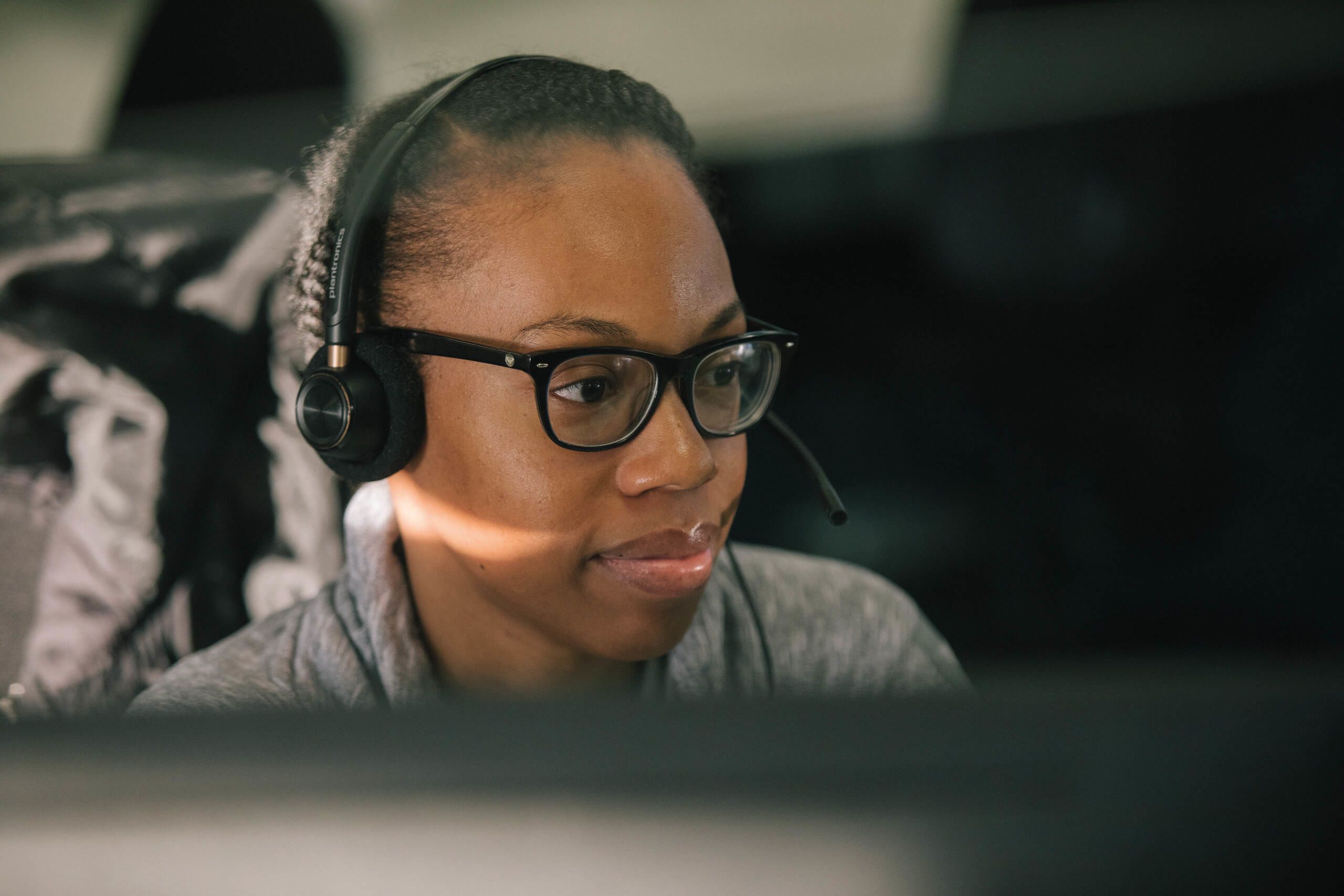
A changing landscape
There is a growing awareness amongst the public of their own role in safeguarding children.
High profile abuse cases, such as the deaths of Star Hobson, Arthur Labinjo-Hughes and Logan Mwangi, have magnified the need for society as a whole to be better at preventing, identifying and responding when children are unsafe.
Research shows that communities play a key role in protecting children – but concerned neighbours, family members, teachers and others often face barriers to reporting their worries when they think a child may be at risk.
Adults may be uncertain about their concerns, uncomfortable to raise them or be scared of reprisals. Many are unsure who to speak to or don’t understand complex referral systems.
The need for advice and support is clear – as shown by the bold recommendations of the Independent Inquiry into Child Sexual Abuse (IICSA), which call for greater protections for children.
A one-stop service
The NSPCC Helpline hears from thousands of worried adults each year, providing a one-stop service to discuss and report concerns.
Whether getting in touch using our single, centralised number, web chat or messaging, adults can remain anonymous when needed. The Helpline often requires no further action from those who contact us – our specialists will take all necessary steps to escalate their concerns for investigation by statutory agencies.


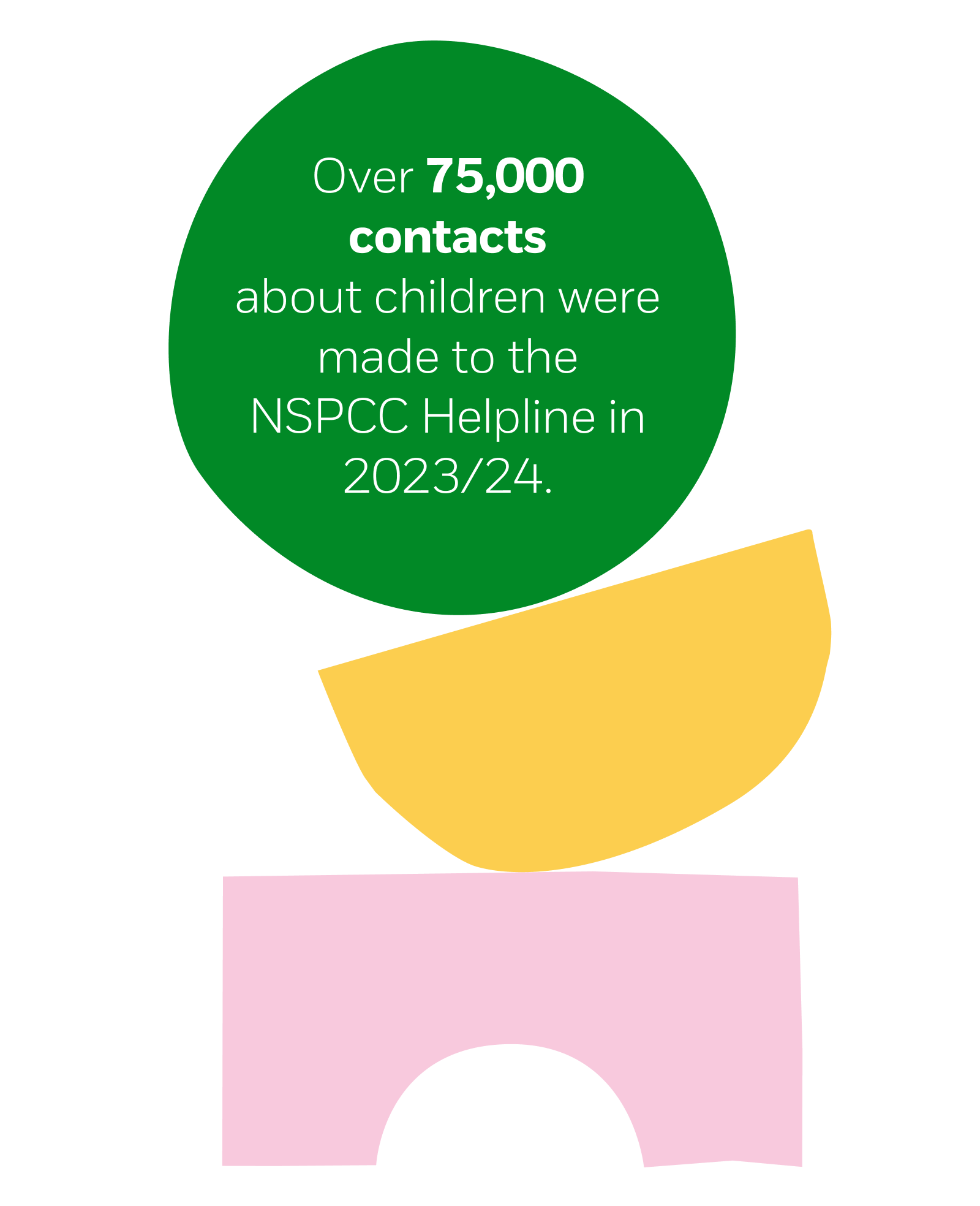
A changing landscape
There is a growing awareness amongst the public of their own role in safeguarding children.
High profile abuse cases, such as the deaths of Star Hobson, Arthur Labinjo-Hughes and Logan Mwangi, have magnified the need for society as a whole to be better at preventing, identifying and responding when children are unsafe.
Research shows that communities play a key role in protecting children – but concerned neighbours, family members, teachers and others often face barriers to reporting their worries when they think a child may be at risk.
Adults may be uncertain about their concerns, uncomfortable to raise them or be scared of reprisals. Many are unsure who to speak to or don’t understand complex referral systems.
The need for advice and support is clear – as shown by the bold recommendations of the Independent Inquiry into Child Sexual Abuse (IICSA), which call for greater protections for children.
A one-stop service
The NSPCC Helpline hears from thousands of worried adults each year, providing a one-stop service to discuss and report concerns.
Whether getting in touch using our single, centralised number, web chat or messaging, adults can remain anonymous when needed. The Helpline often requires no further action from those who contact us – our specialists will take all necessary steps to escalate their concerns for investigation by statutory agencies.
NSPCC Helpline in numbers
Over 75,000 contacts
about children were made to the NSPCC Helpline in 2023/24.
3 in 10
calls and messages led to a referral to external agencies like the police or social services.
4 in 10
of the children referred on were aged five or younger.
£5.5 million
is the cost to run the NSPCC Helpline.

Working together to protect children
Everyone has a role in preventing child abuse – the adults who speak out when something is wrong, the child protection specialists making referrals to statutory agencies, and the donors who fund the NSPCC Helpline.
We help thousands more members of the public and professionals to identify and report abuse each year. That ranges from speaking to parents about their children spending time online to hearing from GPs who suspect sexual abuse.
We are committed to building networks of protection around children, working in close collaboration with statutory services. We give them a voice when needed and speak out on their behalf when they cannot. The NSPCC Helpline links communities and safeguarding support to help keep children safe, anywhere in the UK.
Making effective referrals
We commonly hear that people find it difficult to get their concerns heard when they believe a child is unsafe. Every referral made by the NSPCC Helpline is therefore a potentially valuable piece of evidence that may not have otherwise been available to authorities.
35 minutes
Average conversation length when advice is provided.
60 minutes
Average conversation length when a referral is made.
Our most recent data showed over 30% of calls and messages result in a referral to external agencies. These include social services, the police, adult services, national and even international agencies, and local authority designated officers who manage and oversee allegations.
We proactively seek feedback on our referrals from these agencies to make sure the NSPCC Helpline is as effective as possible.
Even when no further action was required following a referral, long-term research by local authorities also suggests that making contact with families often helped prevent issues from escalating further and becoming abusive. For many families, the Helpline is also a pathway to receiving additional support.

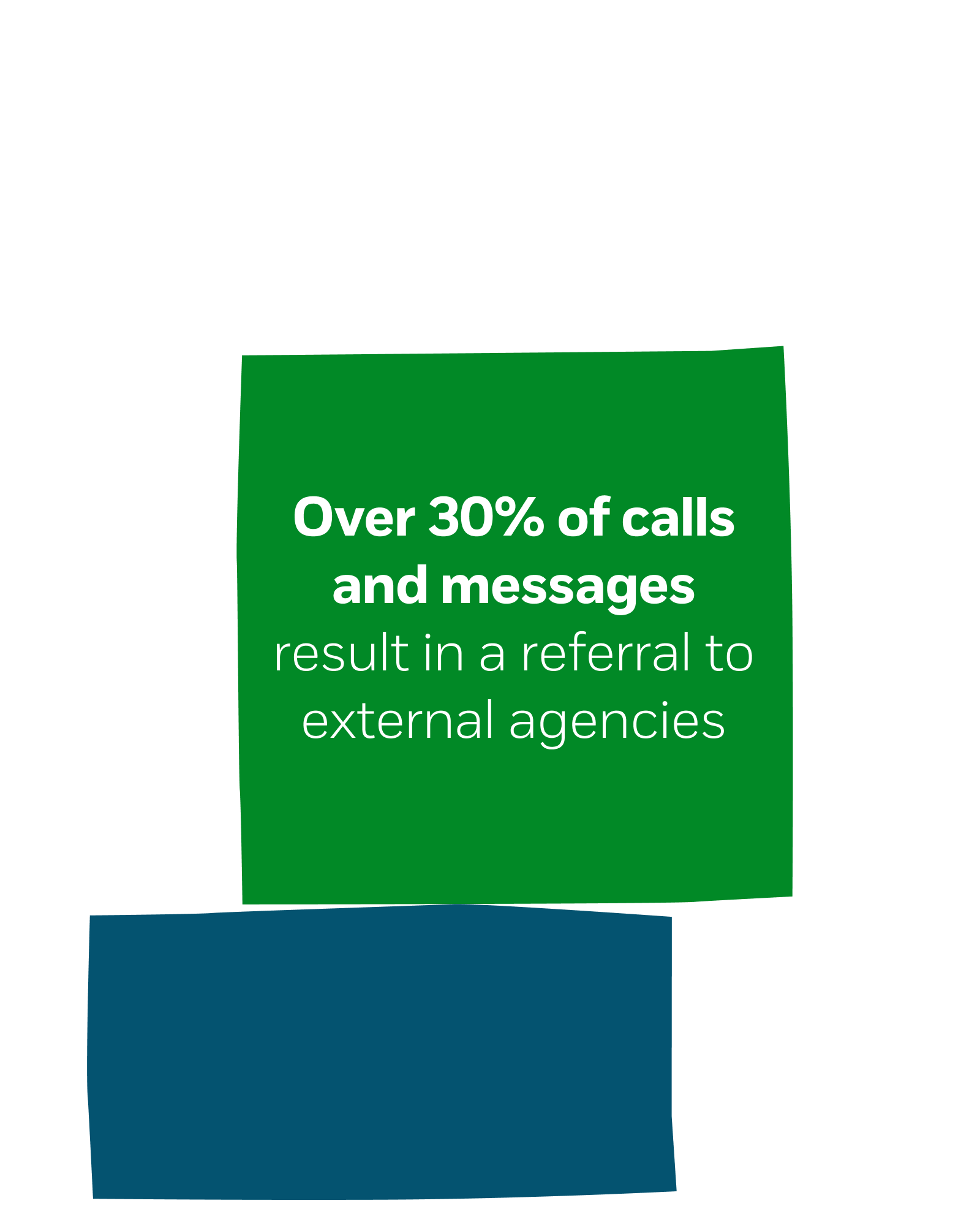
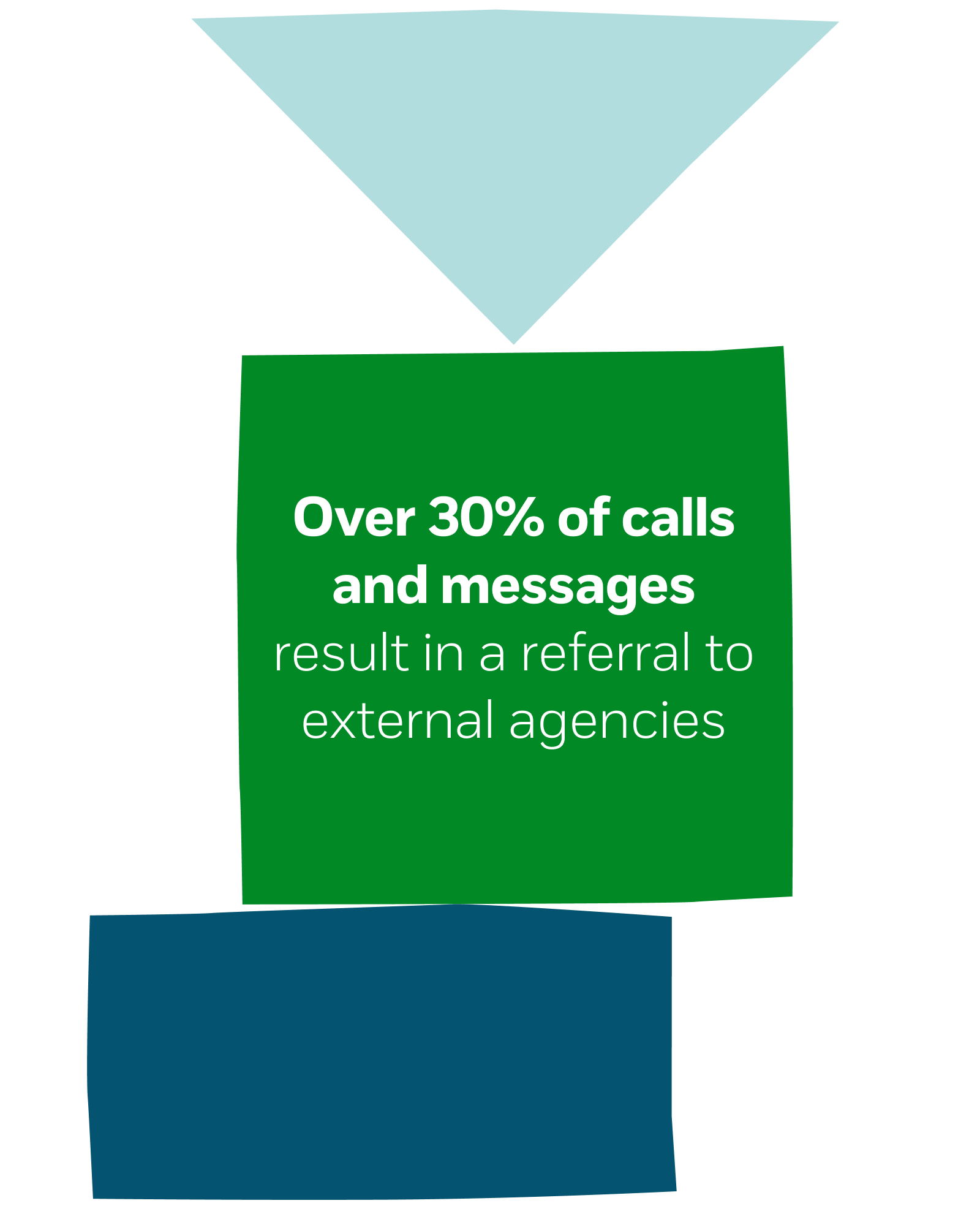
Working together to protect children
Everyone has a role in preventing child abuse – the adults who speak out when something is wrong, the child protection specialists making referrals to statutory agencies, and the donors who fund the NSPCC Helpline.
We help thousands more members of the public and professionals to identify and report abuse each year. That ranges from speaking to parents about their children spending time online to hearing from GPs who suspect sexual abuse.
We are committed to building networks of protection around children, working in close collaboration with statutory services. We give them a voice when needed and speak out on their behalf when they cannot. The NSPCC Helpline links communities and safeguarding support to help keep children safe, anywhere in the UK.
Making effective referrals
We commonly hear that people find it difficult to get their concerns heard when they believe a child is unsafe. Every referral made by the NSPCC Helpline is therefore a potentially valuable piece of evidence that may not have otherwise been available to authorities.
35 minutes
Average conversation length when advice is provided.
60 minutes
Average conversation length when a referral is made.
Our most recent data showed over 30% of calls and messages result in a referral to external agencies. These include social services, the police, adult services, national and even international agencies, and local authority designated officers who manage and oversee allegations.
We proactively seek feedback on our referrals from these agencies to make sure the NSPCC Helpline is as effective as possible.
Even when no further action was required following a referral, long-term research by local authorities also suggests that making contact with families often helped prevent issues from escalating further and becoming abusive. For many families, the Helpline is also a pathway to receiving additional support.
An evolving service
The NSPCC Helpline has been a vital resource for whistleblowers and adults who were victims of abuse during challenging times such as the aftermath of the Jimmy Savile scandal, historical child abuse in football and the response to female genital mutilation (FGM). We have set up dedicated helplines and shape the service according to the most pressing needs.
More recently, coronavirus made stark the value of the NSPCC Helpline to professionals and the wider public. The NSPCC moved to the forefront of service delivery, receiving 85,000 contacts from adults worried about a child’s welfare in the pandemic’s first 12 months – our highest-ever volume of calls and messages.
We also began to receive an increased number of calls about domestic abuse during the COVID-19 pandemic. The NSPCC shared this data with other organisations and developed an enhanced service on this specific issue to provide ongoing support. Our Domestic Abuse Practice Advisors began working more closely with external agencies to build referral pathways and followed up with families to assess the service and its outcomes.
As the first port of call for concerned adults, the NSPCC Helpline is in a unique position to act as an early warning system for government and partners in times of crisis, informing policymakers and shaping the national response.

Monica’s* story
Monica contacted the NSPCC Helpline about a friend of her daughter whose father was sexually abusive.
“I wasn’t prepared for what my daughter’s friend Emily* was going to say. She told me that her father had sexually abused her 13–year-old sister a few days before. We were all in tears. I knew I had to act.
“It was hard to make the call. The NSPCC Helpline advisor reassured me I had done the right thing and explained what would happen next. They said they would need to make an immediate referral.
“Later, I gave a statement to police about what Emily told me. I don’t know exactly what happened after that, but shortly afterwards Emily and her sister no longer lived with their father, and I think he was arrested.
“I wouldn’t hesitate to call the NSPCC again if I was worried about a child, even if I wasn’t sure. If I hadn’t acted as I did I would never have forgiven myself. You have to trust your instincts if something is wrong. We have an obligation to listen to children.”
*Names and identifying features changed to protect identities.


Will you help protect children?
In heartbreaking reports of child abuse, it is common to hear that adults were frustrated or felt ignored by the authorities when they attempted to sound the alarm. Therein lies the power of the NSPCC Helpline. This is a place where people don’t need to know the right words to say or processes to follow to get their concerns heard.
The NSPCC Helpline is proven to make children safer, whether the adults who contact us receive advice or a referral to an external agency.
Our service has become a key stepping stone for concerned adults to access advice, support and urgent interventions by social services, the police and other agencies.
With your support, we can help everyone play their part in keeping children safe from harm. Together, we can remove barriers to reporting abuse and prevent the tragic and unnecessary loss of young lives at the hands of abusers.
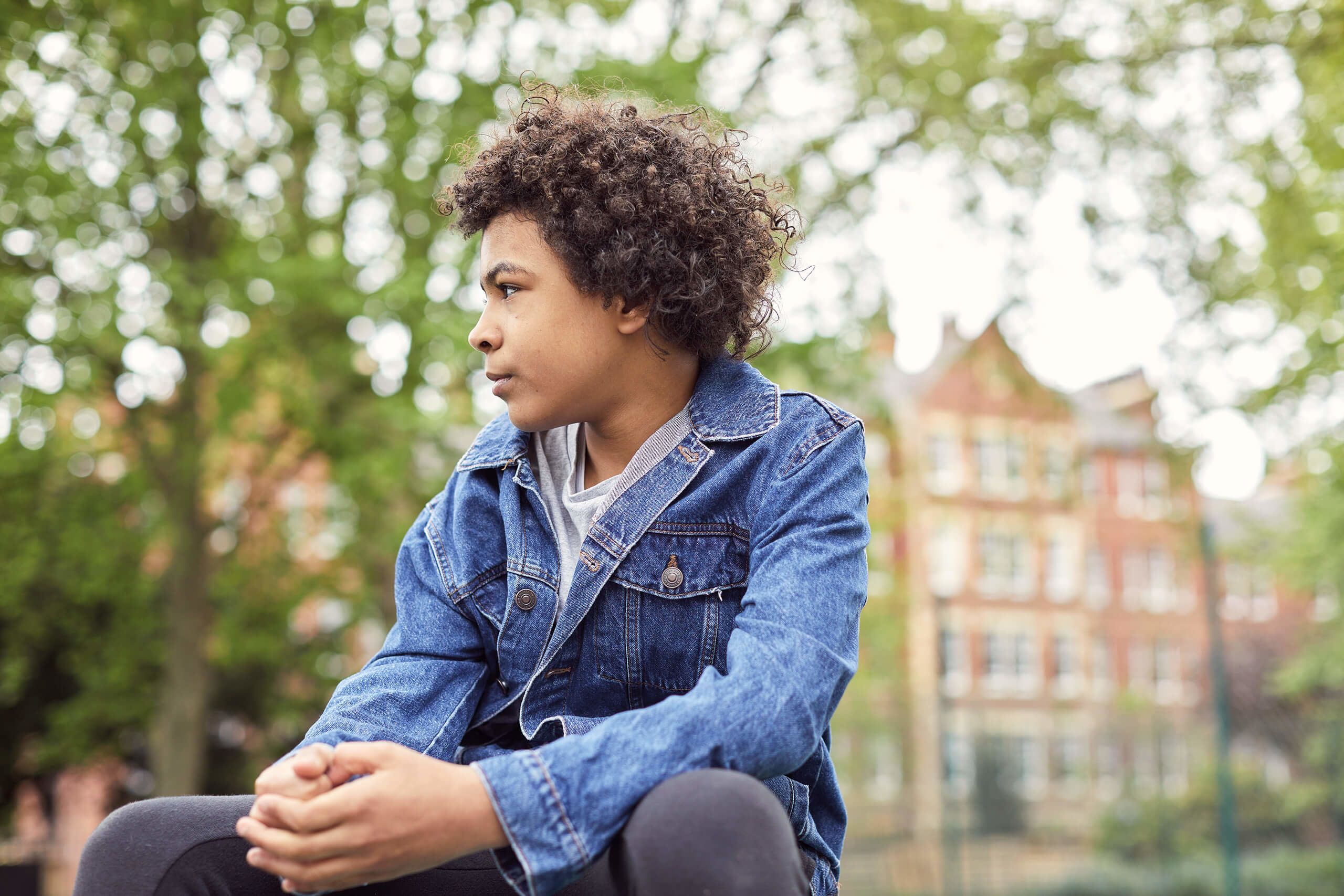
Will you be there for every child?
Your support for the NSPCC’s frontline services will help protect every child in the UK from being abused, wherever and whenever they need help.
You may choose to support one of the services on this page. Or perhaps you have another area of work in mind?
